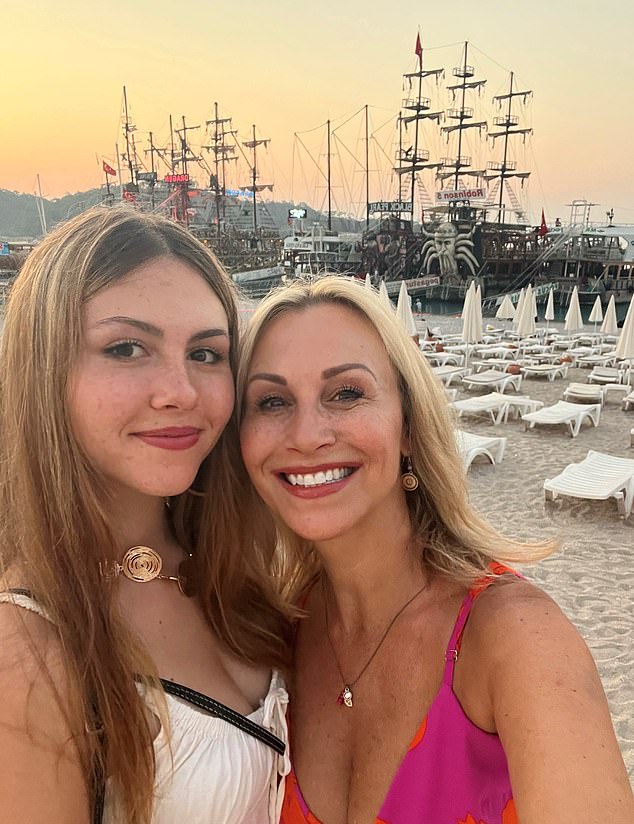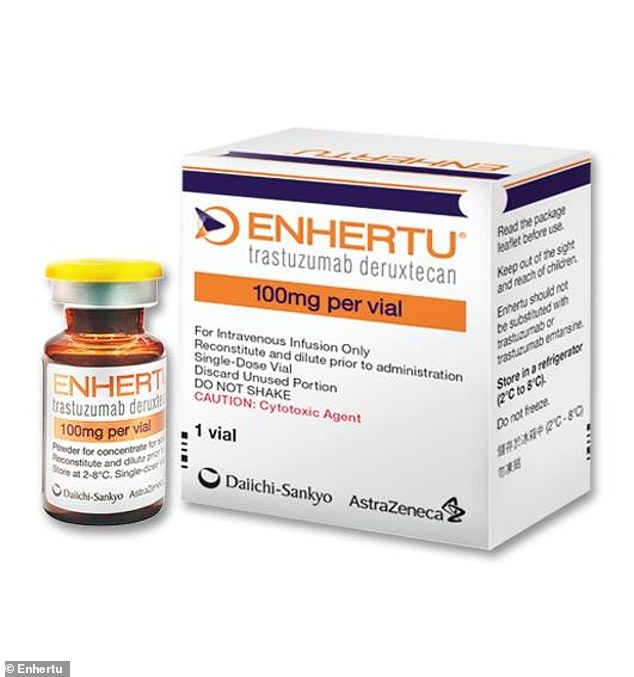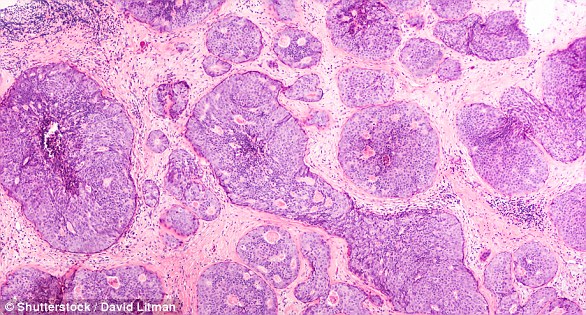‘I just want to see my daughter grow up’: Mother’s heartbreaking plea for breast cancer wonder drug Enhurtu to be banned from women in the NHS as new data shows it increases survival by more than a third
A drug denied to thousands of women with incurable breast cancer could extend survival time by more than a third, new research suggests.
The latest research results show that Enhertu reduces the risk of terminal breast cancer growing or spreading by 38 percent compared to standard chemotherapy.
Charities and campaigners said the new findings add to the sense of ‘betrayal and disbelief’ that they cannot get it on the NHS in England when it is available in Scotland.
It follows a decision by NICE in March to reject the ‘miracle drug’ on grounds of cost, using new criteria that do not classify all terminal cancers as ‘serious’.
Women with HER2-low or ultra-low breast cancer lived an average of 13.2 months without their cancer growing, compared to just 8.1 months among those who received chemotherapy.
Sophie Blake, 51, from Brighton, was diagnosed with breast cancer in December 2020 before being told in May 2022 that the disease had spread elsewhere, including to her lungs and liver.

Sophie, pictured with her daughter Maya, 17, a music academy student, said: ‘I want to see my daughter go to university, get married and have children, Enhertu could make that difference for women.’
Twelve-month survival rates were 87 percent, compared with 81.1 percent, respectively, according to the study of nearly 900 women.
The study, presented at the American Society for Clinical Oncology (ASCO) conference, found that six in 10 patients responded to treatment with Enhertu – twice as many as to chemotherapy.
The findings build on previous studies that showed the treatment improved overall survival rates by more than six months.
Patients said they were forced to spend their final months or years fighting for access to a drug available in thirteen other European countries, as well as the US and Canada.
Sophie Blake, 51, from Brighton, was diagnosed with breast cancer in December 2020 before being told in May 2022 that the disease had spread elsewhere, including to her lungs and liver.
Although the former TV host’s cancer is currently under control, this would be a last line of treatment if necessary.
She said: ‘This is further evidence of the precious extra time this treatment could save us.
“When we are so limited in the options available to us, it is particularly devastating.
‘We know women in Scotland whose lives have been changed. It’s not that it just gives you extension, it’s also about the quality of life.
‘For us, these miracle drugs are everything. I want to see my daughter go to college, get married and have children, Enhertu could make that difference for women.
‘We are mothers, we are sisters, we are daughters, we are employees, we contribute to society and yet we are old. Our lives are not considered cost-effective.
“The most frustrating thing is that we know it’s there, but they just won’t give it to us.
“When we should be enjoying the time we have left with our friends and family, it feels like we should be spending that time fighting for our right to life.”

Patients said they were forced to spend their final months or years fighting for access to a drug available in thirteen other European countries, as well as the US and Canada.
Known as trastuzumab deruxtecan, it is the first approved targeted treatment for patients with a type of cancer known as HER2-low that cannot be removed with surgery or has spread.
Although Enhertu has been licensed in England for patients with HER2-positive breast cancer, access has been denied to those with lower levels of the protein, despite results showing it is equally effective.
Around 1,000 women in England every year could benefit from the drug, which has been described by patients as ‘the last roll of the dice’.
Dr. Giuseppe Curiglian, professor of medical oncology at the University of Milan and author of the latest findings, said the drug could become “the new standard of care” for the disease.
He said: ‘Participants who received trastuzumab deruxtecan lived longer without their disease getting worse or causing death,’ he said, adding that the study for the first time demonstrated the benefits in patients with HER2-ultralow and in patients who had never received chemotherapy had had.’
A Breast Cancer Now petition has more than 260,000 signatures calling for the petition to be made available to these women.
Dr. Simon Vincent, research director at Breast Cancer Now, said it was ‘completely unacceptable’ that thousands of women were ‘denied access’.
He said: ‘This promising study suggests that even more people could potentially benefit from Enhertu.
‘But despite increasing clinical data emerging around the clear benefit that Enhertu could offer patients, thousands of people with HER2-low secondary breast cancer are being denied access to Enhertu through the NHS in England, and this is completely unacceptable.’
‘These people are desperately counting on NICE, NHS England, Daiichi Sankyo and AstraZeneca to find a solution in their current discussions and make this treatment available to them urgently.’
A spokesperson for NICE said it was ‘extremely disappointed’ not to be able to recommend Enhertu for advanced HER2-low breast cancer due to cost, adding that it had ‘paused’ the guidance.
Health officials said talks continued with Daiichi Sankyo and AstraZeneca, but said at a meeting last month that the drug’s makers had increased the price proposal for the drug.
He said: ‘As we made clear during our oral evidence session to the recent Health Select Committee, an award that makes it a cost-effective use of NHS resources, offered by Daiichi Sankyo and AstraZeneca, could solve this problem almost immediately.
“That is the fastest and only guaranteed way to ensure that women can access this treatment without further delay.”

